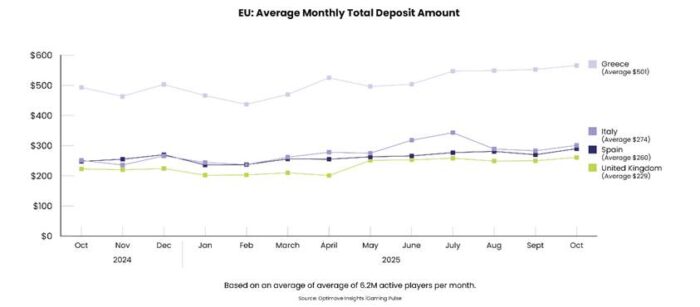On the eve of the new year, SOFTSWISS traditionally releases its 2026 iGaming Trends Report – a format that the company made the industry standard several years ago.
The report is built on independent research from marketing agency Kantar, a quantitative survey of more than 350 igaming professionals, AI-assisted analysis of more than 120,000 media headlines and 30 qualitative interviews with industry experts, combining statistics with human interpretation.
Regulation
“The crucial question is not whether regulation expands, but what kind it becomes,” says Alexey Chepkov, SOFTSWISS COO.
Regulation remains the defining force of 2026. The iGaming Trends Report notes that governments worldwide are entering a phase of regulatory transformation, driven by demands for market accountability, tax transparency and consumer protection.

From Europe’s tightening advertising codes to Asia’s tiered licensing experiments and Brazil’s stable 12% GGR tax (after the proposed 18% hike was withdrawn) new frameworks are no longer viewed purely as restrictions. Instead, regulation is increasingly seen as a competitive advantage – a foundation for trust, investment and long-term growth.
Chepkov adds: “The industry has outgrown its ‘Wild West’ phase, yet we must remain wary of replacing chaos with bureaucracy.”
This tension defines the coming year: operators must navigate between overregulation and under-protection.
Responsible gambling
“AI makes player protection more precise,” notes Emilia Kurzynska, deputy team lead of the anti-fraud team at SOFTSWISS.
In 2026, the transformation of responsible gambling from a compliance checkbox to a strategic business function will continue.
Governments are adopting tougher oversight, linking safer gambling frameworks to public health goals. In Europe, authorities are introducing biometric ID verification, spending caps and mandatory self-exclusion programmes. This shift redefines responsible gambling as part of the overall customer experience rather than just the legal fine print.
The report emphasises the role of AI-driven systems which are reshaping the field by identifying harmful play patterns in real time.
Kurzynska explains: “AI detects harmful patterns early, while also helping operators meet regulatory standards, strengthen compliance and improve the player experience.”
Cybersecurity
“The threat landscape keeps widening,” says Evgeny Zaretskov, group chief information security officer at SOFTSWISS.
As operators scale globally, cybersecurity has become a strategic pillar equal in importance to product and marketing. The 2026 iGaming Trends Report reveals that phishing incidents have surged 180% since 2023, while DDoS attacks surpassed 20 million in Q1 2025 alone.

AI-driven social engineering has expanded the threat landscape. Attackers now target not only systems but also trust, using generative AI to impersonate users and manipulate verification flows.
Zaretskov captures this reality: “Deepfake voices and synthetic identities that can pass KYC make it easier for attackers to impersonate trusted users. A single successful attack can cause severe damage – financial loss, regulatory penalties and erosion of player trust.”
The report urges operators to move from reactive compliance to proactive resilience – embedding security into governance frameworks such as ISO 27001 and NIST.
Microtrends
“The next big shifts often start small,” says Alexander Kamenetskyi, head of sportsbook at SOFTSWISS.
Beyond the major structural forces shaping regulation, technology and compliance, the 2026 iGaming Trends Report also tracks smaller but powerful signals – microtrends.
- Micro-betting
Among the most dynamic microtrends highlighted in the report is micro-betting – wagering on short, in-game events instead of full match outcomes. Evolved from live and in-play betting, this format reshapes the psychology of betting, immersing players in rapid sequences of decisions.
Micro-betting fits perfectly with modern viewing habits as it’s fast, interactive and mobile-first.
That said, Kamenetskyi warns: “Micro-betting carries significant promise, yet its effectiveness will vary across markets and player profiles. The true strategic challenge lies in aligning the product with the right audience – supported by a well-structured marketing strategy and a thoughtful approach to selecting the right solutions”.
- Formula 1
Formula 1 betting is gaining momentum, capitalising on the Netflix’s Drive to Survive success. Global interest in this sport is on the rise: in 2025, the fanbase expanded by 12%, reaching over 826 million followers worldwide.
The F1 trend also reflects a broader truth: sports, content and betting are merging into one continuous entertainment ecosystem.
- Cross-vertical growth
Another emerging signal is the convergence between sports betting and casino entertainment. It creates ideal conditions for cross-selling between sportsbooks and online casinos. A player who bets on a football match might receive free spins linked to that event, while casino users are encouraged to place pre-match bets during major tournaments.
The report’s data shows that players active in both verticals are far more valuable. Their lifetime value can be up to 50% higher than that of sports-only users, while casino players who also bet generate around one-third more revenue than those who stick to a single segment.
Kamenetskyi adds: “In 2026, we will see more casino operators expanding into sports betting, effectively merging two verticals that have long been treated separately. The first wave came from sportsbooks, which opened casinos to broaden their offer. Now casinos are catching up, accelerating their entry into sports.”
The takeaway is clear – when products work together, engagement deepens and player value grows.
Challenging the changes
The 2026 iGaming Trends Report doesn’t predict the future in grand terms; it maps it with data. Its insights serve as both a warning and a guide: regulation is tightening, cyberthreats are increasing and player expectations are evolving.
The question for 2026 is not whether the industry will change – it’s how to change to keep pace with it.

SOFTSWISS is an international technology company with over 15 years of experience in developing innovative solutions for the igaming industry. SOFTSWISS provides comprehensive software for managing igaming projects.
The company’s product portfolio includes the Casino Platform, the Game Aggregator with over 35,000 casino games, Affilka Affiliate Platform, the Sportsbook Platform and the Jackpot Aggregator. The expert team, based in Malta, Poland and Georgia, counts over 2,000 employees.
The post Faster games, smarter rules, safer play – the 2026 iGaming Trends Report from SOFTSWISS explains all first appeared on EGR Intel.

.png) 4 hours ago
6
4 hours ago
6













